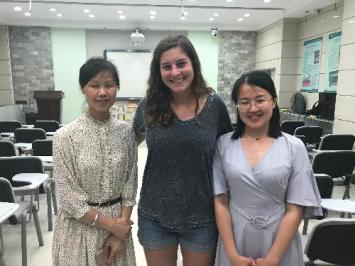 I think the biggest barrier for people learning Mandarin and attempting to communicate with natural born speakers is the different tones. In English we do not use tones as extensively and in China one voice inflection creates a different meaning. In class on the trip when we would practice tones it also seemed as though some of my classmates could not pronounce the Chinese tones because they could not hear the subtle differences. When I first began learning Mandarin someone told me that if you do not learn Mandarin before the age of 5 you will never be able to correctly hear and speak the tones like a fluent speaker does. I whole heartily believe this. On the trip there were times when I knew a Chinese word and would ask a student volunteer about the word and they would look at me with a blank face. I would repeat myself a few times and then they would finally repeat the word themselves with the correct tones and ask if that was the word that I intended to say. Overall, before the trip I knew that tones were an important part of the Mandarin language but after going to China and witnessing real time communication I saw just how vital they are to speak.
I think the biggest barrier for people learning Mandarin and attempting to communicate with natural born speakers is the different tones. In English we do not use tones as extensively and in China one voice inflection creates a different meaning. In class on the trip when we would practice tones it also seemed as though some of my classmates could not pronounce the Chinese tones because they could not hear the subtle differences. When I first began learning Mandarin someone told me that if you do not learn Mandarin before the age of 5 you will never be able to correctly hear and speak the tones like a fluent speaker does. I whole heartily believe this. On the trip there were times when I knew a Chinese word and would ask a student volunteer about the word and they would look at me with a blank face. I would repeat myself a few times and then they would finally repeat the word themselves with the correct tones and ask if that was the word that I intended to say. Overall, before the trip I knew that tones were an important part of the Mandarin language but after going to China and witnessing real time communication I saw just how vital they are to speak.
Since high school I have been interested in Asian culture and the Mandarin language but having the opportunity to visit China heightened that interest. Eventually I hope to be fluent in Mandarin even though I know that will be a tough task to accomplish. However, seeing the student volunteers be able to communicate effectively in English makes me believe that I have the capability. One of my biggest realizations from the trip is how far away I am from being fluent in Chinese. When I took Mandarin classes the hardest part for me was speaking and pronouncing the tones correctly. After spending a lot of time with fluent speakers I know that in order to accomplish my goal of being fluent I need to work on speaking the most if I truly desire to be able to communicate effectively. I would like to go back to China in the future when I am a strong speaker and be able to navigate the cities by communicating with locals in Mandarin.
-Samantha Bell, Faculty-led at Southeast University in Nanjing, China, Summer 2018
You must be logged in to post a comment.